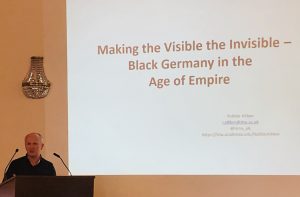A compelling exhibition sharing the unique experiences of the Black community in Germany before the Second World War opens its doors in London today. The exhibition, ‘Black Germany before the Second World War (1884-1945)’, will be displayed at the German Historical Institute and is based on ground-breaking research by Dr Robbie Aitken, a Reader in history at Sheffield Hallam University.

The exhibition uses biographies and a range of images to narrate the development of the black diaspora in Germany.
It looks at the routes and reasons that brought men and women from Africa to Germany pre-1914, the development of African-German families in the aftermath of World War One, the forms of employment and the politics of black residents during the interwar period, and explores the little-known fate of black residents and their German-born children during the Nazi period.
Among the life stories featured are:
- The black German Communist Joseph Ekwe Bilé – a veteran of World War One, who also performed on the stage alongside Paul Robeson and Josephine Baker, and who was later trained as a political activist in Moscow
- The Cameroonian film star Bebe Mpessa, who is better known to German audiences as Louis Brody
- The Togolese businessman and human zoo impresario Nayo Bruce, who toured most of East and West Europe with his own performance troupe composed largely of family members
- The Berlin-born African-German woman Zoya Aqua-Kaufmann, who was forced to flee Germany from the Nazis after the introduction of the Nuremberg Laws. Zoya would later be arrested by the Gestapo and imprisoned in the notorious Pankrác Prison in Prague.
Dr Aitken said: “The history of a black presence in Germany before 1945 remains largely unknown. This exhibition makes visible some of the extraordinary life stories of the black men and women and their German-born children who carved out a life worth living in Germany against increasingly difficult odds.
“The exhibition demonstrates the active role they played not just in German history, but in the history of Empire and anti-colonialism, in the culture of the Weimar period, in the history of various African states and in the development of Black Internationalism.”
Dr Aitken will also be delivering an opening lecture today at the German Historical Institute entitled: “Making the Visible the Invisible – Black Germany in the Age of Empire”.
The event will also feature a talk by the poet, dramaturge and editor Philipp Khabo Koepsell (Berlin), on “Afro-Deutschland – The Making of an Activist Movement“.
“Black Germany before the Second World War”, is at the German Historical Institute from May 14 to 11 June 11. Admission is free and more information can be found here
Please click here to return to this months news bulletin
